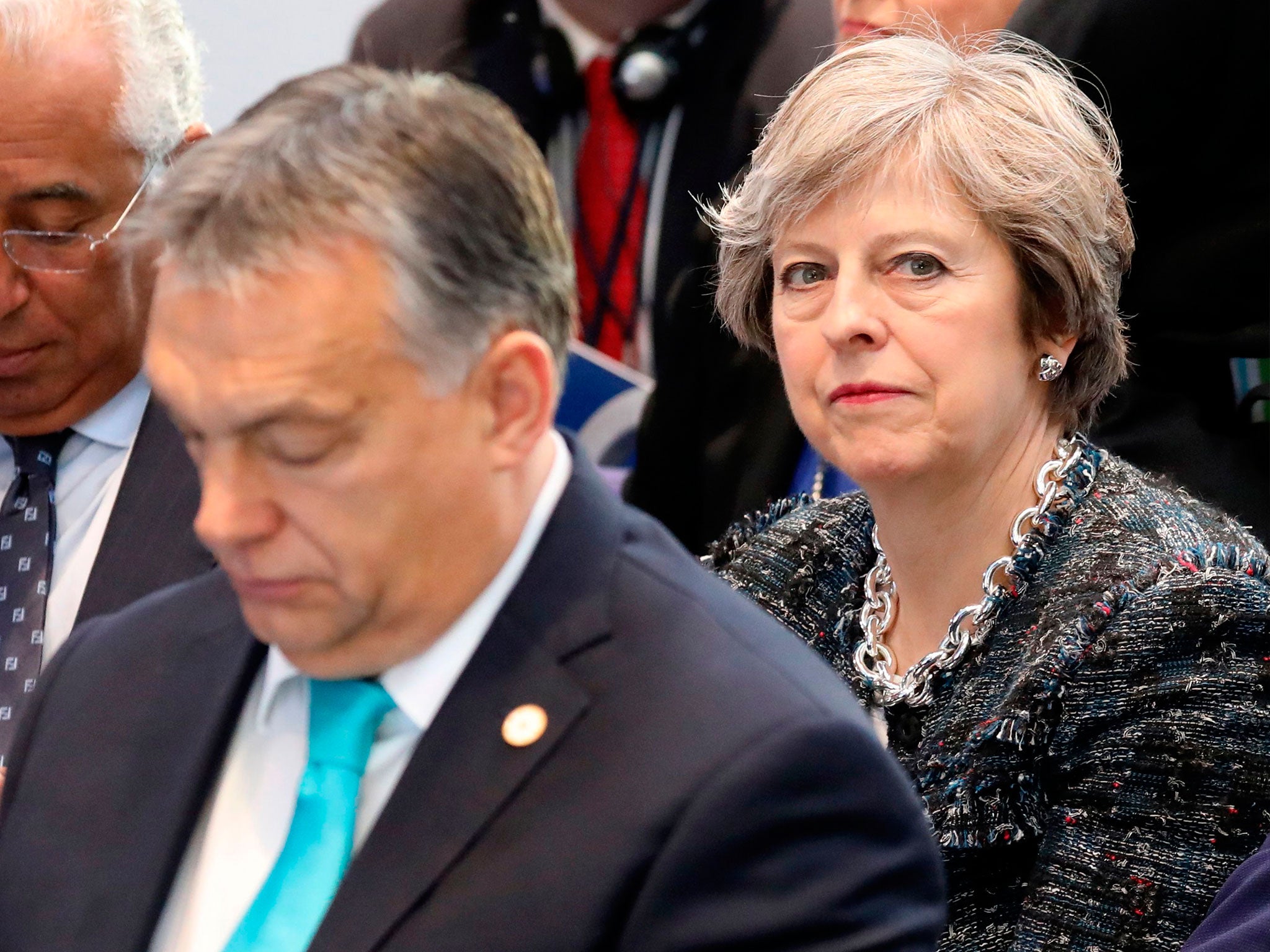Tories were only governing conservative party in western Europe to support Hungarian far-right in EU vote
Theresa May's MEPs isolated amongst conservatives amid claims of trading favours for support on Brexit
Your support helps us to tell the story
From reproductive rights to climate change to Big Tech, The Independent is on the ground when the story is developing. Whether it's investigating the financials of Elon Musk's pro-Trump PAC or producing our latest documentary, 'The A Word', which shines a light on the American women fighting for reproductive rights, we know how important it is to parse out the facts from the messaging.
At such a critical moment in US history, we need reporters on the ground. Your donation allows us to keep sending journalists to speak to both sides of the story.
The Independent is trusted by Americans across the entire political spectrum. And unlike many other quality news outlets, we choose not to lock Americans out of our reporting and analysis with paywalls. We believe quality journalism should be available to everyone, paid for by those who can afford it.
Your support makes all the difference.The Tories were the only governing conservative party in western Europe to vote en masse in support of Viktor Orban’s far-right government, an analysis of votes by The Independent has found.
The Conservatives whipped their 19 MEPs to oppose action against Hungary, with just one defiantly voting for the motion.
The European Parliament voted by a two-thirds majority, 448–197, to start the Article 7 process against Hungary, which has been accused of violating press freedoms, undermining judicial independence, and waging an antisemitic campaign against a leading Jewish businessman.
The Conservatives, who lined up with the continent’s far-right, argued the motion was “politicised” and counterproductive, but critics at home accused them of deliberately cosying up to Mr Orban to win his support in Brexit talks.
Arriving in Strasbourg, a grateful Mr Orban heaped praise on the British government, telling reporters: “We would like to have a fair Brexit because we love the British and because we cooperated always well – and you deserve a good deal, a fair deal.”
Of the Tory MEPs, only Nosheena Mobarik rebelled to vote for the motion, while two others, Charles Tannock and Sajjad Karim, abstained. Separately, Richard Ashworth and Julie Girling, who were elected as Conservatives but left their political group over Brexit and do not take the whip, also backed action.
As well as undermining civil rights, the judiciary, and attacking Jewish businessman George Soros, Mr Orban’s government is subject to allegations of corruption relating to the alleged misspending of EU funds by his friends and family. Mr Orban himself has described refugees as “Muslim invaders” and been accused of being deeply Islamophobic.
The Conservatives’ votes were nearly decisive, because the motion required a two-thirds majority to pass, and only did so by 22 votes.
In the continent’s east, Bulgarian governing conservative party GERB and the governing Croatian Democratic Union joined the Tories to lend their support to Hungary’s government.
But most of the support for Viktor Orban came from the far-right and populists, such as Poland’s Law and Justice Party, Italy’s League, and France’s recently rebranded National Front. Groups like the Sweden Democrats, Austrian FPOe, and Ukip opposed the motion.
Just a handful of western European conservative MEPs opposed the motion, with no others being whipped to do so. Only three of Spain’s 17-member conservative delegation did so, as well as three of France’s 19-member group. Austria’s conservative OeVP MEPs all voted in favour of action after an intervention by Chancellor Sebastian Kurz.

In Germany, four MEPs from the Bavarian CSU voted against the motion in a free vote, but party chief Manfred Weber supported the censure. One MEP from Angela Merkel’s vast CDU delegation also rebelled to support Mr Orban.
Among opposition conservative parties, MEPs from Poland’s opposition conservative Civic Platform party mostly backed the motion, while Italian allies of Silvio Berlusconi voted against it, as did the Slovenian delegation.
Opposition parties strongly criticised the Conservatives' decision. Labour’s Shadow Chancellor John McDonnell said: “Is Theresa May going to call out those Tory MEPs, who were whipped to vote to support Viktor Orban against a censure motion for his attacks on refugees and his antisemitism and Islamophobia? If not, I wouldn’t advise her to lecture anyone on racism again.”
Ahead of the vote, Conservative MEP home affairs spokesperson Daniel Dalton said the motion “crosses a boundary by politicising what should be a purely legal matter”. He argued that MEPs should have “no role to play” in triggering Article 7, though the text Article in fact specifically gives powers to the European Parliament.
If the Article 7 procedure is taken to its conclusion it could see Hungary stripped of its voting rights at the European Council.
Green MEP Molly Scott Cato told The Independent: “The self-inflicted harm from Brexit leaves us vulnerable, having alienated our closest friends and allies. This can be the only explanation for Tory MEPs choosing to vote to protect Orbán and his rotten regime, which has clearly failed to protect freedom of speech and the rule of law.
“Law breaking by the Leave campaigns also makes clear that Brexit risks to democratic standards at home, something that seems to have been influenced by the Tories decision to sit with unsavoury far right characters like the Sweden Democrats in the European Parliament.”

Join our commenting forum
Join thought-provoking conversations, follow other Independent readers and see their replies
Comments